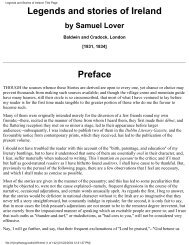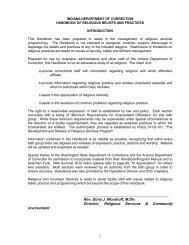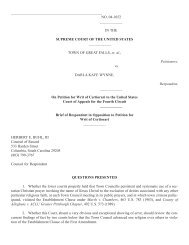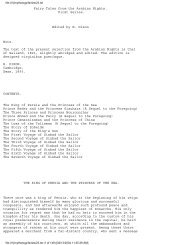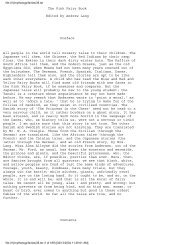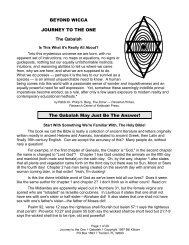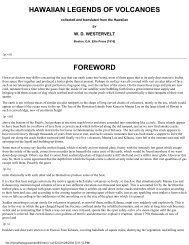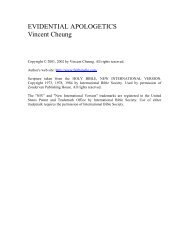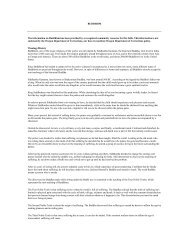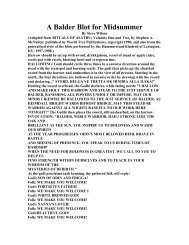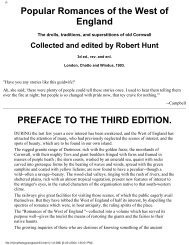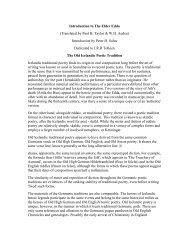Create successful ePaper yourself
Turn your PDF publications into a flip-book with our unique Google optimized e-Paper software.
to the surprise of the shepherds, suddenly carried across to the more distant parts.' Sheep are known to get on the floating islet, and it is<br />
still believed to float them away from the shore. Mr. S. Rhys Williams, it will be noticed, has given the substance of the legend rather than<br />
the story itself. I now proceed to translate the same tale as given in Welsh in Cymru Fu (pp. 474--7 of the edition published by Messrs.<br />
Hughes and Son, Wrexham), in a very different dress--it is from Glasynys' pen, and, as might be expected, decked out with all the literary<br />
adornments in which he delighted. The language he used was his own, but there is no reason to think that he invented any of the<br />
incidents:--'The farmer of Drws y Coed's son was one misty day engaged as a shepherd on the side of the mountain, a little below Cwm<br />
Marchnad, and, as he crossed a rushy flat, he saw a wonderfully handsome little woman standing under a clump of rushes. Her yellow and<br />
curly hair hung down in ringed locks, and her eyes were as blue as the clear sky, while her forehead was as white as the wavy face of a<br />
snowdrift that has nestled on the side of Snowdon only a single night. Her two plump cheeks were each like a red rose, and her<br />
pretty-lipped mouth might make an angel eager to kiss her. The youth approached her, filled with love for her, and, with delicacy and<br />
affection, asked her if he might converse with her. She smiled kindly, and reaching out her hand, said to him, "Idol of my hopes, thou hast<br />
come at last!" They began to associate secretly, and to meet one another daily here and there on the moors around the banks of Llyn y<br />
Gader; at last, their love had waxed so strong that the young man could not be at peace either day or night, as he was always thinking of<br />
Bella or humming to himself a verse of poetry about her charms. The yellow-haired youth was now and<br />
p. 92<br />
then lost for a long while, and nobody could divine his history. His acquaintances believed that he had been fascinated: at last the secret<br />
was found out. There were about Llyn y Dywarchen shady and concealing copses: it was there he was wont to go, and the she-elf would<br />
always be there awaiting him, and it was therefore that the place where they used to meet got to be called Llwyn y Forwyn, the Maiden's<br />
Grove. After fondly loving for a long time, it was resolved to wed; but it was needful to get the leave of the damsel's father. One<br />
moonlight night it was agreed to meet in the wood, and the appointment was duly kept by the young man, but there was no sign of the<br />
subterranean folks coming, until the moon disappeared behind the Garn. Then the two arrived, and the old man at once proceeded to say to<br />
the suitor: "Thou shalt have my daughter on the condition that thou do not strike her with iron. If thou ever touch her with iron, she will no<br />
longer be thine, but shall return to her own." The man consented readily, and great was his joy. They were betrothed, and seldom was a<br />
handsomer pair seen at the altar. It was rumoured that a vast sum of money as dowry had arrived with the pretty lady at Drws y Coed on<br />
the evening of her nuptials. Soon after, the mountain shepherd of Cwm Marchnad passed for a very rich and influential man. In the course<br />
of time they had children, and no happier people ever lived together than their parents. Everything went on regularly and prosperously for<br />
a number of years: they became exceedingly wealthy, but the sweet is not to be had without the bitter. One day they both went out on<br />
horseback, and they happened to go near Llyn y Gader, when the wife's horse got into a bog and sank to his belly. After the husband had<br />
got Bella off his back, he succeeded with much trouble in getting the horse out, and then<br />
p. 93<br />
he let him go. Then he lifted her on the back of his own, but, unfortunately, in trying quickly to place her foot in the stirrup, the iron part<br />
of the same slipped, and struck her--or, rather, it touched her at the knee-joint. Before they had made good half their way home, several of<br />
the diminutive Tylwyth began to appear to them, and the sound of sweet singing was heard on the side of the hill. Before the husband<br />
reached Drws y Coed his wife had left him, and it is supposed that she fled to Llwyn y Forwyn, and thence to the world below to Faery.<br />
She left her dear little ones to the care of her beloved, and no more came near them. Some say, however, that she sometimes contrived to<br />
see her beloved one in the following manner. As the law of her country did not permit her to frequent the earth with an earthly being, she<br />
and her mother invented a way of avoiding the one thing and of securing the other. A great piece of sod was set to float on the surface of<br />
the lake, and on that she used to be for long hours, freely conversing in tenderness with her consort on shore; by means of that plan they<br />
managed to live together until he breathed his last. Their descendants owned Drws y Coed for many generations, and they intermarried<br />
and mixed with the people of the district. Moreover, many a fierce fight took place in later times at the Gwyl-fabsant at Dolbenmaen or at<br />
Penmorfa, because the men of Eifionydd had a habit of annoying the people of Pennant by calling them Bellisians.'<br />
In a note, Glasynys remarks that this tale is located in many districts without much variation, except in the names of the places; this,<br />
however, could not apply to the latter part, which suits Llyn y Dywarchen alone. With this account of the fairy wife frequenting a lake<br />
island to converse with her husband on shore, compare the Irish story of the Children of Lir, who, though<br />
p. 94<br />
<strong>Title</strong> <strong>Page</strong><br />
transformed into swans, were allowed to retain their power of reasoning and speaking, so that they used to converse from the surface of<br />
the water with their friends on the dry land: see Joyce's Old Celtic Romances, pp. x, 1-36. Now I return to another tale which was sent me<br />
by Mr. William Jones: unless I am mistaken it has not hitherto been published; so I give the Welsh together with a free translation of it:--<br />
Yr oedd ystori am jab Braich y Dinas a adroddai y diweddar hybarch Elis Owen o Gefn y Meusydd yn lled debyg i chwedl mab yr Ystrad<br />
gan Glasynys, sef iddo hudo un o ferched y Tylwyth Teg i lawr o Foel Hebog, a'i chipio i mewn i'r ty drwy orthrech; ac wedi hynny efe a'i<br />
perswadiodd i ymbriodi ag ef ar yr un telerau ag y gwnaeth mab yr Ystrad. Ond clywais hen foneddiges o'r enw Mrs. Roberts, un o<br />
ferched yr Isallt, oed' lawer hyn na Mr. Owen, yn ei hadrodd yn wahanol. Yr oedd yr hen wreigan hon yn credu yn nilysrwydd y chwedl,<br />
oblegid yr oedd hi 'yn cofio rhai o'r teulu, waeth be' ddeudo neb.' Dirwynnai ei hedau yn debyg i hyn:--Yn yr amser gynt--ond o ran hynny<br />
pan oedd hi yn ferch ifanc--yr oedd llawer iawn o Dylwyth Teg yn trigo mewn rhyw ogofau yn y Foel o Gwm Ystradllyn hyd i flaen y<br />
Pennant. Yr oedd y Tylwyth hwn yn llawer iawn harddach na dim a welid mewn un rhan arall o'r wlad. Yr oeddynt o ran maint yn fwy o<br />
lawer na'r rhai cyffredin, yn lan en pryd tu hwnt i bawb, eu gwallt yn oleu fel llin, eu llygaid yn loyw leision. Yr oeddynt yn ymddangos<br />
file:///I|/mythology/celtic/26/26.html (50 of 237) [01/22/2004 12:42:26 PM]



